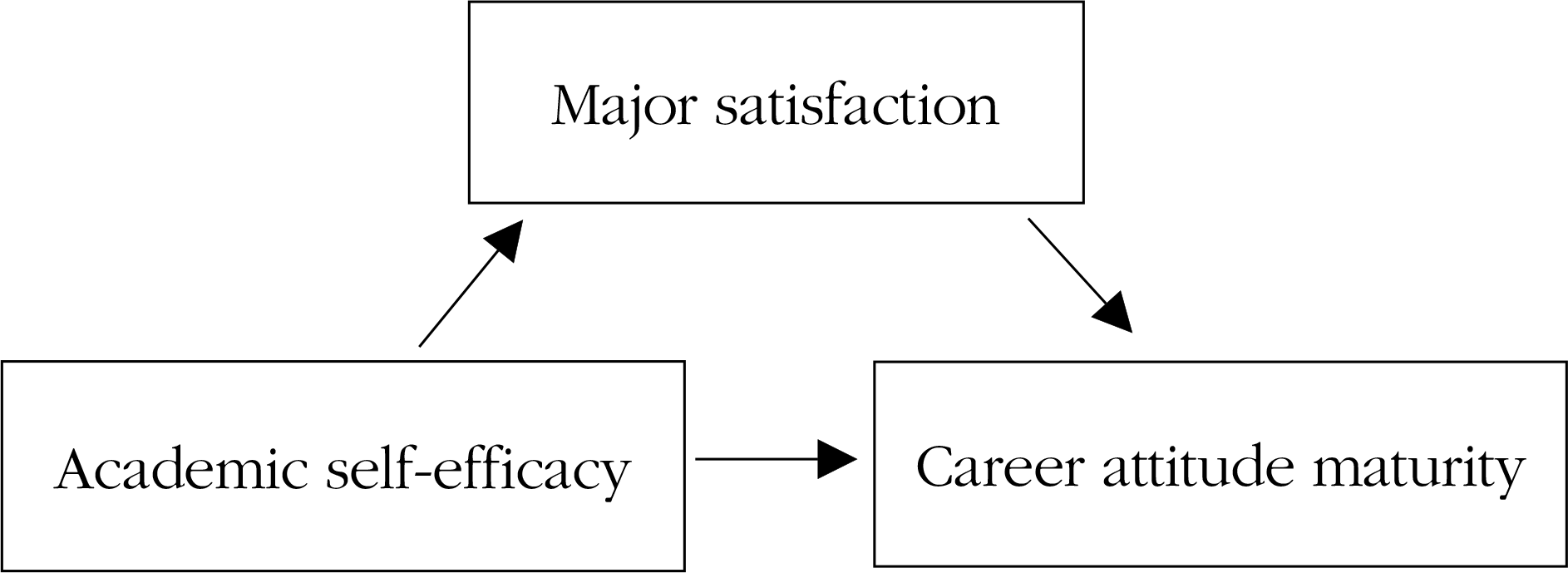Abstract
Purpose
This study examines the relationships between academic self-efficacy, major satisfaction, and career attitude maturity among nursing students. The study further explored the mediating effect of major satisfaction on the relationship between academic self-efficacy and career attitude maturity.
Methods
Data were collected via questionnaires from 239 nursing students in D city and P city from March 1 to March 30, 2012. Pearson's correlation and multiple regression analyses were used to assess the relationships between the variables.
Results
1. The mean scores for academic self-efficacy, career attitude maturity, and major satisfaction were 3.81, 3.67, and 3.89, respectively. 2. Academic self-efficacy was positively correlated with major satisfaction and career attitude maturity. 3. Major satisfaction had a mediating effect on the relationship between academic self-efficacy and career attitude maturity.
Go to : 
REFERENCES
Bandura A.1986. Social foundation of thought and action: A social cognitive theory. Englewood Cliffs, NJ: Prentice Hall.
Bennett J. A.2000. Mediator and moderator variables in nursing research: Conceptual and statistical differences. Research in Nursing & Health. 23:415–420.

Cha M. H.., Lee J. A.2012. The relationships of perceived fit, academic self-efficacy, and major adjustment. Journal of Vocational Education Research. 31(4):227–243.
Chang K. M.2005. The influence of university students' career decision level and academic self-efficacy on their adjustment to university. Korean Journal of Counseling. 6(1):185–196.
Cheong M. H.., Park S. M.., Shin G. S.2004. The path analysis of variables effecting major adjustment in college students. Korean Journal of Counseling. 5(1):95–111.
Ha H. S.2000. A study of department satisfaction and school satisfaction of undergraduate students. Unpublished master's thesis, Seoul National University, Seoul.
Han J. C.., Lee K. H.1997. Validation on instrument of career attitude maturity. Journal of Career Education Research. 8:219–255.
Jang S. C.2003. Typology of university students' career decision and analysis of related personal and cognitive variables. Unpublished doctoral dissertation, Konkuk University, Seoul.
Jeong H. Y.., Park O. L.2009. A correlation analysis of the sense of value, self efficacy, major satisfaction level, and career maturity level of beauty care major college students. Journal of the Korea Society Beauty and Art. 10(1):35–49.
Jo S. J.2010. A study on determining factors for community college students' department choice based on consumers' centered education. Interdisciplinary Journal of Adult & Continuing Education. 13(3):111–151.
Kang S. H.2010-a. Relationships between major satisfaction and career decision efficacy and career attitude maturity of engineering college students. Journal of Fisheries and Marine Sciences Education. 22(2):151–164.
Kang S. H.2010-b. The effects of major satisfaction, career decision efficacy and career attitude maturity of engineering college students to the career decision level. Journal of Vocational Education Research. 29(3):291–307.
Kim H. J.2007. The influence of college students' major satisfaction and flow experience on career decision efficacy and career attitude maturity. Unpublished master's thesis, Sungkyunkwan University, Seoul.
Kim M. A.., Lim J. Y.., Kim S. Y.., Kim E. J.., Lee J. E.., Ko Y. K.2004. Influencing factors on nursing students' career attitude maturity. Journal of Korean Academy Psychiatric and Mental Health Nursing. 13(4):383–391.
Kim W. K.., Kim E. J.2012. The structural relationship among self efficacy, major satisfaction and career decision efficacy of sports related majoring students. Journal of Korean Society for the Study of Physical Education. 17(2):65–77.
Ko B. S.2011. The effects of academic self-efficacy on the relationship between career barriers and career consciousness maturity of middle school students. Unpublished master's thesis, Ajou University, Suwon.
Ko B. S.., Kim Y. H.2011. The effects of academic self-efficacy on the relationship between career barriers and career consciousness maturity of middle school students. Korean Journal of East West Science. 14(2):29–42.
Koo H. Y.., Park H. S.2005. Career attitude maturity and its predictors of university students. Korean Journal of Counseling. 6(2):373–385.
Kwon H. J.., Kim B. R.., Kim S. Y.., Kim S. J.., Sung J. A.., Shin Y. M., et al. 2009. A study on the career attitude maturity according to the clinical practice experience of the college of nursing students. Journal of Ewha Nursing. 43:41–50.
Lee E. A.2007. Adolescence's course view determinants and changes through the grade. Journal of Korean Society. 8(1):121–162.
Lee J. A.2012. Mediating effect of outcome expectations in the relationship of academic self-efficacy to major adjustment of college students. Korean Journal of Counseling. 13(5):2329–2344.
Lee J. A.., Choi W. Y.2010. Comparison between college students with and without disabilities in academic self-efficacy, social supports, and career aspirations. Disability & Employment. 20(2):55–76.
Lee K. H.., Han J. C.1998. The relationship between the maturity of career attitude and personal characteristics and psychological variables of high school students in Korea. Journal of Counseling and Psychotherapy. 10(1):167–189.
Lee K. H.., Lee H. J.2000. The effects of career self-efficacy in predicting the level of career attitude maturity of college students. Journal of Counseling and Psychotherapy. 12(1):127–136.
Lee S. H.2006. The relationship between dispositional variables, career barriers, career decision-making self-efficacy and career attitude maturity of college students. Journal of Counseling and Psychotherapy. 18(2):399–417.
Lee S. H.., Chun T. J.2006. Relation between self-efficacy and career decision-making according to the perceived athletic competence of middle school and high school athlete students. Korean Journal of Sociology of Sport. 19(1):171–184.
Go to : 
Table 1.
General Characteristics of the Subjects (N=239
Table 2.
Score for Academic Self-efficacy, Major Satisfaction and Career Attitude Maturity (N=239
| Variables | Min | Max | M±SD |
|---|---|---|---|
| Academic self-efficacy | 18 | 40 | 30.48±4.28 |
| Major satisfaction | 31 | 60 | 46.70±6.16 |
| Career attitude maturity | 72 | 122 | 95.51±9.98 |
Table 3.
Correlation among Academic Self-efficacy, Major Satisfaction, and Career Attitude Maturity (N=239
Table 4.
Mediating Effect of Major Satisfaction on the Relationship between Academic Self-efficacy and Career Attitude Maturity




 PDF
PDF ePub
ePub Citation
Citation Print
Print



 XML Download
XML Download